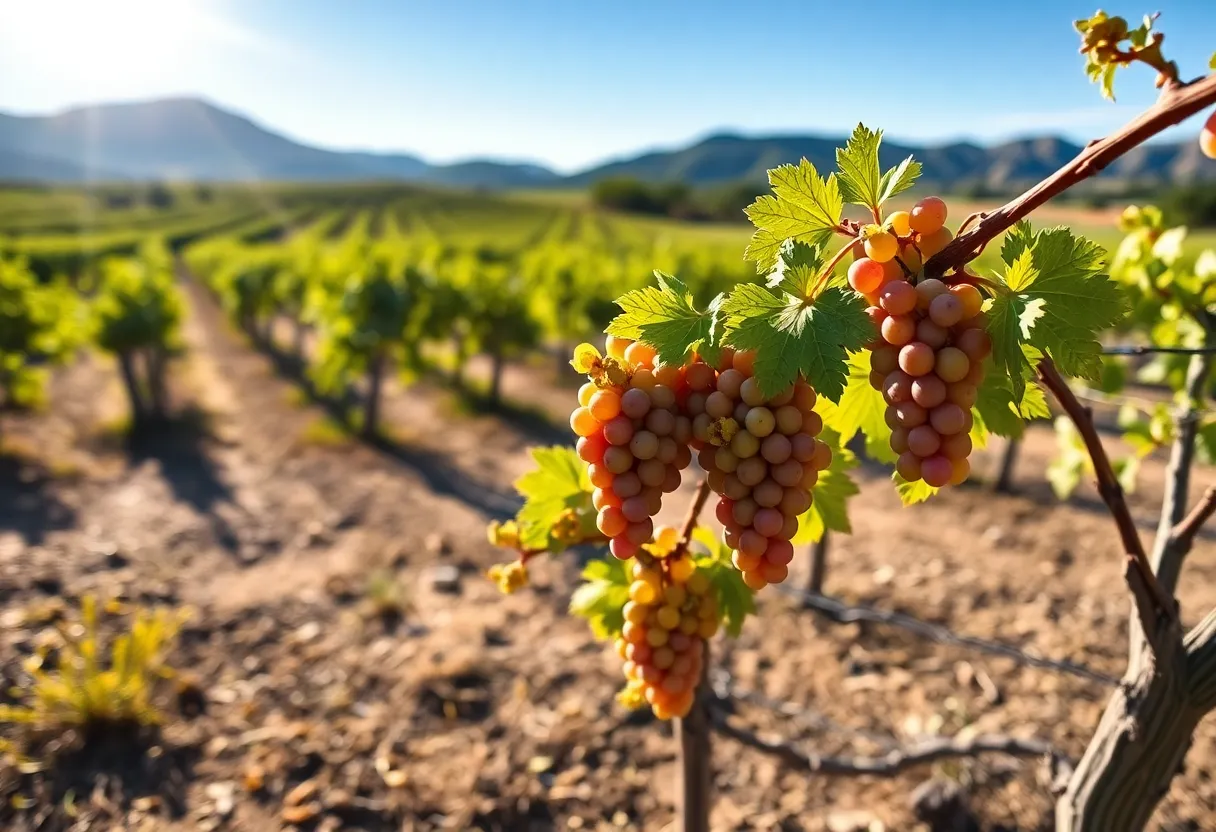Tucson, AZ, October 17, 2025
The wine industry in Tucson, AZ, is experiencing a significant surge, with a 15% sales increase attributed to eco-friendly practices and growing tourism interest. Local wineries are taking advantage of sustainable farming techniques and expanding into new markets, especially California. This rise not only enhances visibility but also creates job opportunities in the local economy, reflecting a promising future for the region’s wine scene.
Tucson Wine Industry Sees 15% Sales Increase Driven by Eco-Friendly Practices and Tourism
Tucson, AZ – Southern Arizona’s wine industry is experiencing significant growth, with a notable 15% sales increase fueled by sustainable practices and rising tourism interest. This surge highlights the region’s emerging prominence in the national wine landscape, drawing both investors and visitors to local vineyards.
Key Growth Drivers
The expansion stems from a strong emphasis on eco-friendly production methods, which have appealed to environmentally conscious consumers. Wineries in the area have adopted sustainable farming techniques, such as water conservation and organic pest management, contributing directly to the sales boost. Additionally, tourism plays a crucial role, as events like wine tastings and vineyard tours attract thousands of visitors annually, enhancing revenue streams beyond local markets.
Local establishments, including operations similar to Pillsbury Vineyards, are capitalizing on this momentum by broadening their reach. Export efforts targeting states like California have opened new avenues for distribution, allowing Southern Arizona wines to compete on a larger scale. These initiatives reflect a strategic shift toward diversified markets, reducing reliance on domestic sales alone.
Market Trends and Insights
Recent observations from industry tastings underscore the positive trajectory. Participants noted the appeal of Southern Arizona’s unique terroir, which produces distinctive varietals suited to the desert climate. This has positioned Tucson as a rising hub within the U.S. wine scene, where innovation in winemaking meets growing consumer demand for regional specialties.
The 15% sales increase marks a continuation of steady progress over the past few years. Factors such as improved branding and partnerships with tourism boards have amplified visibility. Wineries report higher foot traffic during peak seasons, with visitors seeking immersive experiences that combine wine education and scenic outings. This influx not only supports immediate sales but also fosters long-term loyalty among out-of-state buyers.
Expansion into Export Markets
Targeting California represents a pivotal move for Southern Arizona producers. The state’s vast consumer base offers substantial opportunities for growth, particularly for wines emphasizing sustainability. Shipments to this market have already shown promising uptake, with distributors expressing interest in featuring desert-grown labels. Such expansions help mitigate risks associated with localized economic fluctuations, ensuring more stable operations.
Broader Impact on Tucson’s Economy
The wine industry’s rise underscores Tucson’s evolving role in agriculture and hospitality. As production scales, job creation in viticulture, marketing, and event planning benefits the local workforce. Investors are taking notice, injecting capital into infrastructure upgrades like expanded cellars and visitor centers. This development aligns with broader efforts to diversify the region’s economy, moving beyond traditional sectors.
Tourism integration has been particularly effective. Collaborations between wineries and local hotels provide package deals that extend stays, boosting ancillary businesses such as restaurants and transportation services. The result is a ripple effect that strengthens community ties and promotes sustainable land use in the arid Southwest.
Challenges Amid Growth
Despite the optimism, industry leaders acknowledge hurdles like climate variability and regulatory hurdles for exports. Adapting to these requires ongoing investment in resilient practices, yet the overall outlook remains positive. The focus on eco-friendly methods not only addresses environmental concerns but also differentiates Southern Arizona wines in competitive markets.
Historical Context
Southern Arizona’s wine heritage dates back decades, with pioneers establishing vineyards in the challenging Sonoran Desert. Early efforts laid the groundwork for today’s innovations, transforming marginal lands into productive estates. Over time, advancements in irrigation and grape selection have elevated quality, earning accolades at national competitions.
The recent 15% sales increase builds on this foundation, signaling maturity in the sector. What began as a niche pursuit has grown into a vital economic driver, attracting global attention. As Tucson continues to invest in its wine identity, the region stands poised for further prominence, blending tradition with forward-thinking strategies.
This growth trajectory offers lessons for other emerging wine regions, emphasizing the power of sustainability and experiential marketing. For Southern Arizona, it reaffirms the potential of local resources to thrive on a national stage, inviting more stakeholders to participate in its unfolding success story.
FAQ
What is driving the 15% sales increase in Southern Arizona’s wine industry?
How are local wineries like Pillsbury Vineyards expanding?
What role does Tucson play in the national wine scene?
Where were insights on market trends shared?
Key Features of Southern Arizona’s Wine Industry Growth
| Feature | Description | Impact |
|---|---|---|
| Sales Increase | 15% rise in sales | Boosts revenue and market presence |
| Eco-Friendly Practices | Sustainable farming and production | Attracts environmentally conscious consumers |
| Tourism | Wine tastings and vineyard tours | Increases visitor numbers and local economy |
| Export Expansion | Markets to California | Diversifies sales channels |
| Tucson’s Role | Emerging national hub | Draws investors and visitors |
Deeper Dive: News & Info About This Topic
HERE Resources
Davis-Monthan Air Force Base Awards $10 Million Contract to AeroTech Solutions
Tucson City Council Rejects Immigration Compact Proposal




